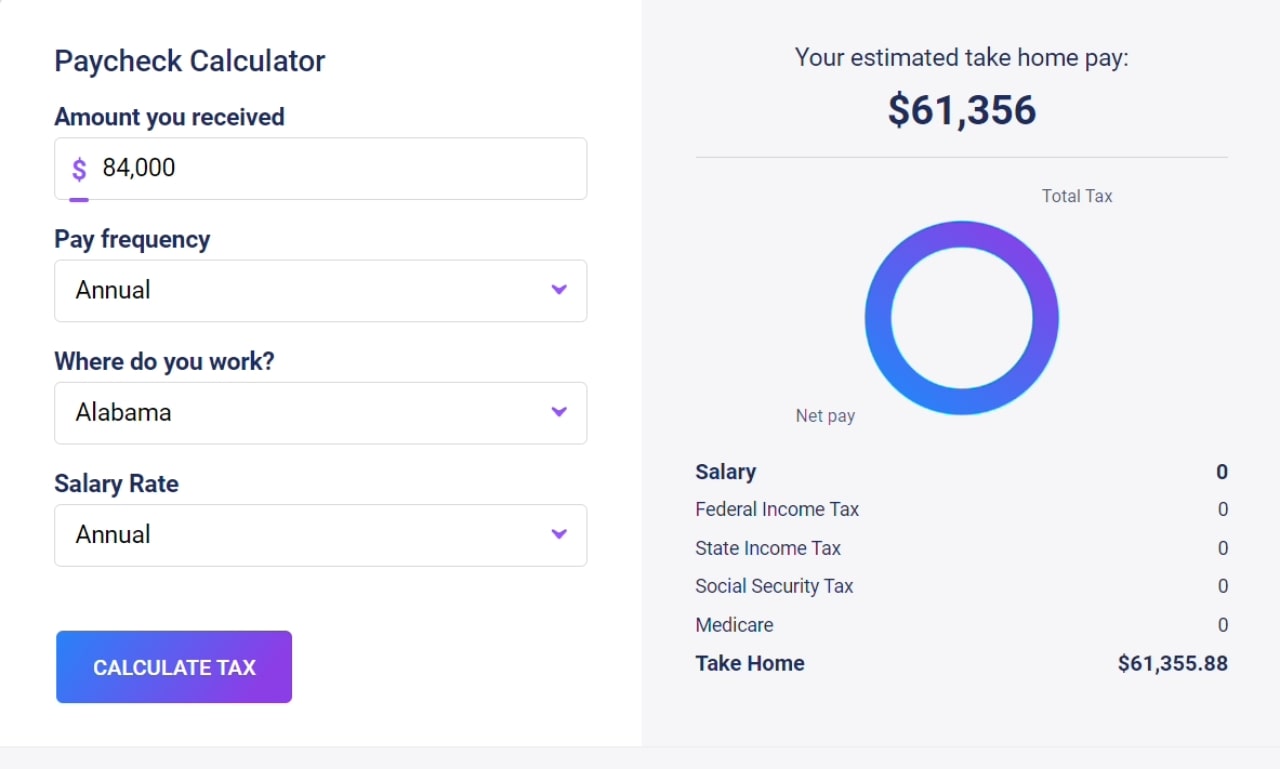Salary discussions in job interviews can be like navigating a minefield—step too early, and you risk appearing solely money-focused; step too late, and you might find yourself investing time and effort in a job that doesn’t meet your financial needs.
However, addressing the topic of salary is an essential part of the interview process, one that requires careful consideration and strategy.
In this article, we’ll share practical strategies and tips on how to ask about salary in an interview to help you address this essential topic with confidence and professionalism.
Why Discussing Salary Matters
Discussing your salary in a job interview isn’t just about the numbers—it’s a crucial dialogue that can shape the entire trajectory of your career.
When you openly discuss your compensation, you’re making sure that the company’s financial parameters match your aspirations. It’s a way to make sure the role fits not only professionally but also financially.
This approach saves you from investing excessive time and effort in pursuing a position that may not be a good fit, allowing you to focus your energy on opportunities that truly match your needs.
How To Ask About Salary in an Interview
Asking about salary during a job interview requires tact and timing. Here are some tips on how to approach this topic:
- Build rapport first: Before delving into the subject of compensation, focus on building a rapport with the interviewer. Engage in a meaningful conversation about your skills, experiences, and the value you can bring to the organization. Demonstrating your genuine interest in the role beyond just the paycheck can set a positive tone for the salary discussion.
- Use diplomatic language: When it’s appropriate to inquire about salary, use open-ended and diplomatic language. Avoid direct, abrupt questions about money. Instead, ask questions that encourage a discussion, such as, “Could you provide some insights into the compensation package for this role?” or “What is the salary range for this position?”
- Prepare for the discussion: Approach the salary discussion with confidence and preparation. Anticipate potential responses from the interviewer and be ready to address any follow-up questions. Consider role-playing with a friend or mentor to refine your approach.
- Listen actively: When the employer responds to your salary inquiry, listen attentively. Take note of the salary range or details provided. This information will be valuable for your decision-making process.
- Discuss additional benefits: Remember that compensation isn’t just about the base salary. Inquire about other benefits, such as healthcare, retirement plans, bonuses and stock options. These perks can significantly impact the overall value of the job offer.
- Stay flexible: Be open to negotiation. If the initial offer doesn’t meet your expectations, express your gratitude for the opportunity and politely inquire if there’s room for discussion. Keep in mind that negotiation is a standard part of the hiring process, and it’s an opportunity for both parties to find a mutually beneficial arrangement.
- Consider the full package: While salary is important, also evaluate the entire compensation package. Take into account factors like company culture, growth opportunities, work-life balance and the potential for career advancement. Striking the right balance between salary and other job attributes is essential for overall job satisfaction.
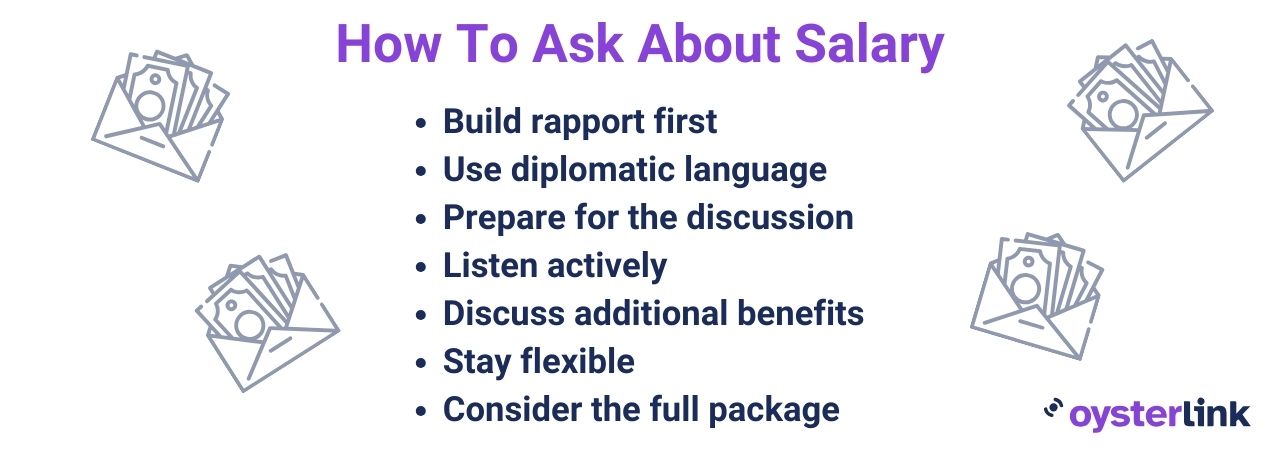
When To Bring Up Salary
Timing is key when it comes to discussing salary during a job interview. You don’t want to jump the gun, but you also don’t want to leave it until the last minute.
Here are some useful tips for when to approach this important topic in your job interview:
- Wait for the right moment: Avoid diving into salary discussions too early in the interview. Let the conversation flow naturally, and wait until you have a good understanding of the job’s responsibilities and the company’s expectations.
- Let the interviewer initiate: In some cases, the interviewer may bring up salary expectations first. If this happens, respond honestly but avoid giving a specific number right away. Express your interest in the role and inquire about the salary range they have in mind.
- Bring the salary up before the final decision: It’s generally advisable to discuss salary before you reach the final decision stage. This ensures that both you and the employer are on the same page regarding compensation, preventing any surprises or misunderstandings at the last minute.
Remember that the timing of salary discussions can vary depending on the company, the industry and the specific interview process. It’s essential to adapt your approach based on the context of the interview and to ensure that the conversation flows smoothly while maintaining professionalism and enthusiasm for the role.
Researching Salary Expectations
Equipping yourself with a thorough understanding of realistic compensation is a pivotal step before discussing your salary in an interview.
Start by delving into industry norms. Each sector has its own unique compensation standards, and various online resources provide detailed salary guides and reports tailored to specific fields.
Also consider reaching out to colleagues, mentors or industry peers who might possess firsthand knowledge of compensation trends in your field. Their insights can provide invaluable, real-world perspectives on what to anticipate.
However, it’s not just about the broader industry; you must zoom in on the company you’re interviewing with. Different organizations have their own compensation philosophies and practices.
Scour the company’s official website and read employee reviews that shed light on their compensation policies. Understanding the particular dynamics of your prospective employer is vital in setting your expectations.
Other factors you shouldn’t overlook when setting your salary expectations are:
- Location: Salaries can vary dramatically based on where you work. The cost of living differs from one city to another, profoundly affecting the standard salary for a given role.
- Prior experience: Research how your level of expertise aligns with typical salary ranges for your desired position. Note that entry-level, mid-career and senior roles often come with distinct compensation expectations.
- Education and skills: Advanced degrees, specialized certifications and specialized skills can command higher salaries in the job market.
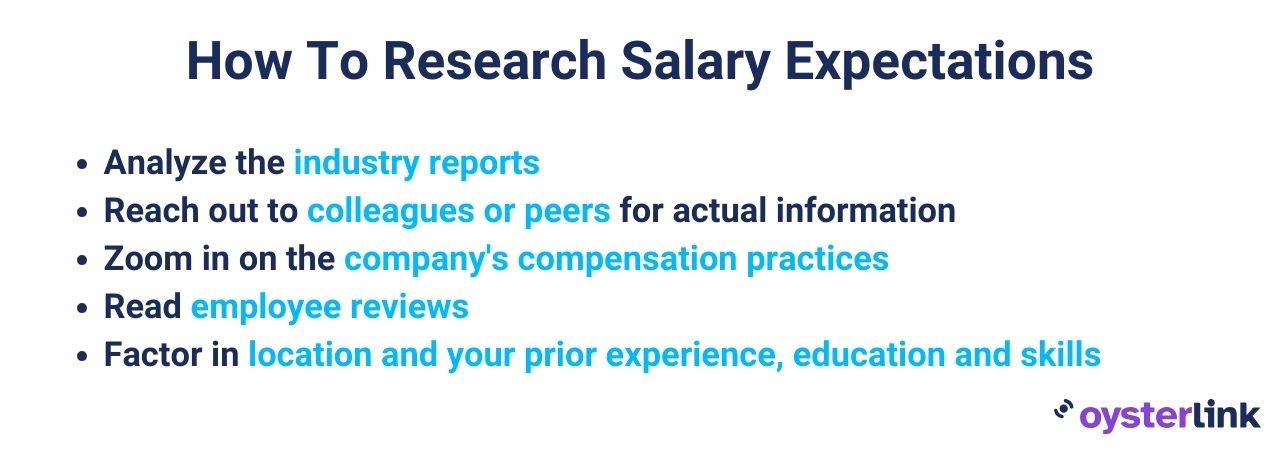
OysterLink’s Paycheck Calculator can provide quick estimates based on factors like your job title and location. Use it to build a clearer picture of what to expect.
Handling the “Salary History” Question
Navigating a job interview involves more than just discussing future salary; you may also encounter questions about your salary history. Even though 14 U.S. states have banned this practice during the last couple of years to create a fairer playing field for job seekers, it’s still a topic that can come up in job interviews in some states.
Here are some tips on how to effectively navigate questions about your salary history:
- Stay calm and composed: When faced with the salary history question, avoid becoming defensive or confrontational. Take a deep breath and respond thoughtfully.
- Prepare a response in advance: This will help you answer confidently and concisely.
- Use general ranges: Instead of divulging exact figures, provide a salary range or ballpark figure. This allows you to share some information while retaining a degree of privacy.
- Emphasize relevance: Explain how your past experiences and compensation relate to the role you’re applying for. For instance, “While my previous role had a different compensation structure, the skills I gained there are directly transferable to this position.”
- Practice your tone: Pay attention to your tone of voice and body language. Maintain a positive and professional demeanor throughout the conversation.
In the states with salary history bans, you have the right to refuse to disclose your salary history if asked. Unfortunately, some employers may not be fully informed about or compliant with these laws.
The map below shows the states with state-wide salary history bans:
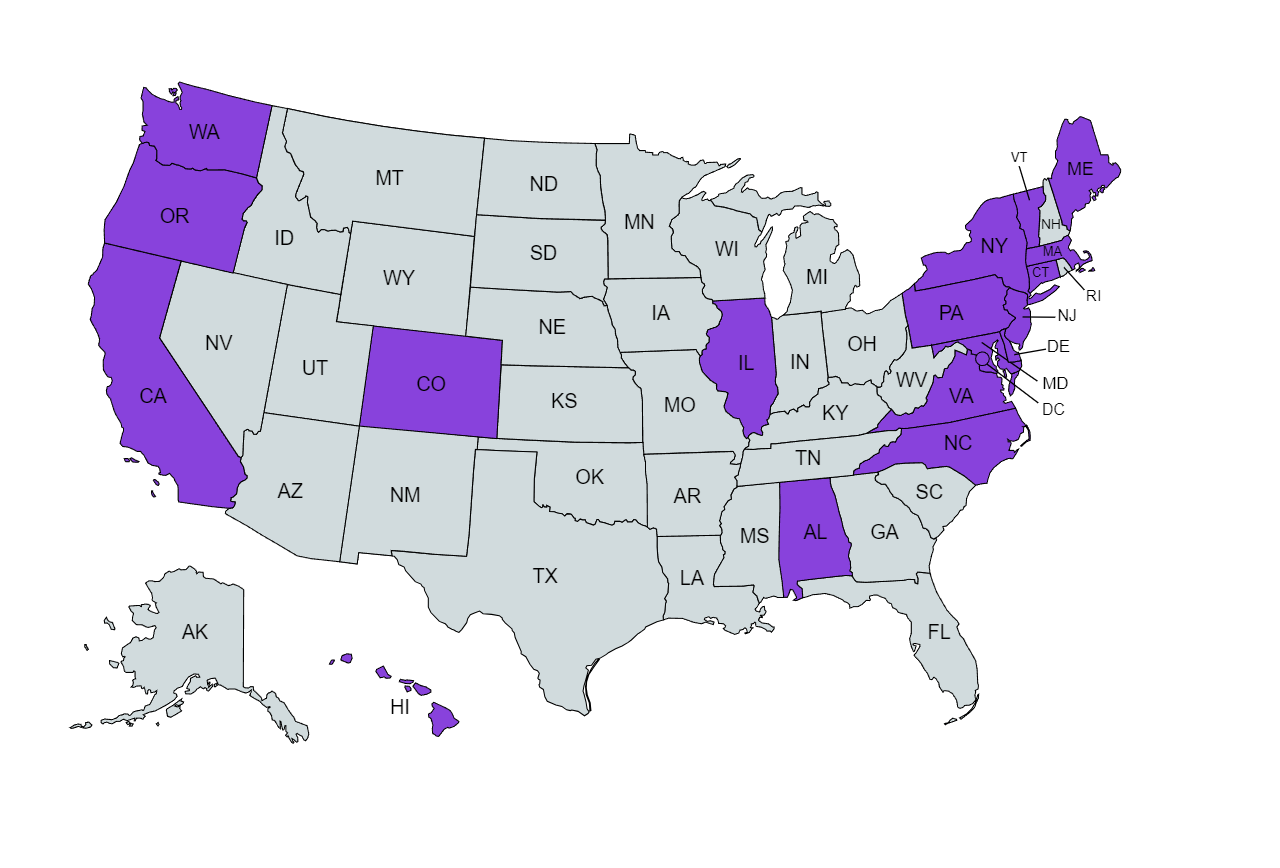
One effective approach to navigate away from the topic of salary history is to redirect the conversation toward your prospective contributions to the organization. You can do this by highlighting your unique qualifications, inquiring about the company’s expectations, sharing your vision for success and demonstrating genuine enthusiasm for the role and the organization.
Common Mistakes To Avoid
Avoiding these common mistakes can help you navigate salary discussions with confidence and increase the likelihood of securing a fair and mutually beneficial compensation package:
- Bringing up salary too early: Jumping the gun can give the impression that you’re more focused on compensation than on the job itself.
- Failing to research salary expectations: Not doing your homework on industry norms and company-specific compensation practices is a big mistake. Being uninformed can lead to setting unrealistic expectations or accepting a lower offer than you deserve.
- Providing a specific figure: Instead of providing a specific figure, provide a range based on your research and qualifications. This gives you room for negotiation and prevents you from potentially undervaluing yourself.
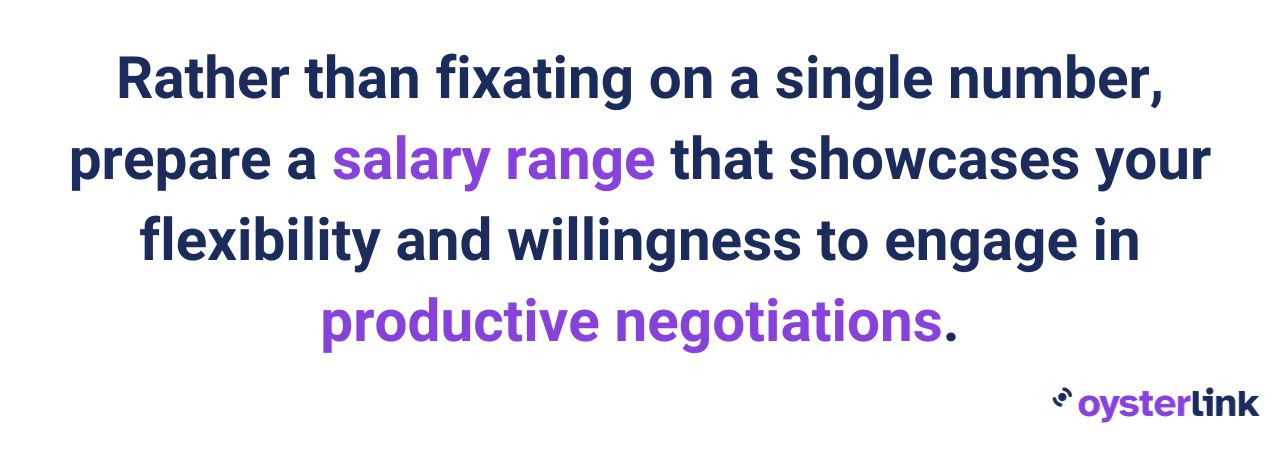
- Not expressing enthusiasm for the role: While it’s important to negotiate your compensation, it’s equally crucial to convey genuine enthusiasm for the position and the company.
- Neglecting to consider the entire compensation package: Don’t fixate solely on the base salary. Consider the entire compensation package, including benefits, bonuses, stock options and other perks. Some companies may offer excellent non-monetary benefits that compensate for a slightly lower base salary.
- Being inflexible: While it’s essential to have a salary range in mind, be open to negotiation. Being too rigid can hinder the process.
- Oversharing personal financial information: Avoid divulging personal financial details or reasons for needing a higher salary. Keep the conversation professional and focused on the value you bring to the organization.
- Speaking negatively about a previous employer: Never speak negatively about your previous employer, especially in the context of salary discussions. It can raise concerns about your attitude and professionalism.
- Not preparing for the “expected salary” question: Be ready to answer this question with confidence. A well-prepared response demonstrates that you’ve thoughtfully considered your worth.
How To Ask About Salary in an Interview: Frequently Asked Questions
Can I ask about salary and benefits in an interview?
Yes, it is entirely appropriate to ask about salary and benefits during a job interview. In fact, it’s an essential part of the interview process for both you and the employer.
Discussing compensation and benefits ensures that the role aligns with your financial expectations and allows you to make an informed decision about whether the job is the right fit for you.
When’s the best time to ask about salary?
The best time to ask about salary is after you’ve gained a clear understanding of the job’s responsibilities and the company’s expectations for the role. Ideally, this discussion should occur after you’ve had a chance to showcase your qualifications and enthusiasm for the position.
Avoid bringing up salary too early in the interview, as it may give the impression that you’re primarily motivated by financial considerations.
Can I wait until the hiring manager brings up the salary?
Yes, you can wait for the hiring manager to initiate the salary discussion. In some interviews, the employer may bring up salary expectations early on, while in others, they may wait until later stages of the interview process.
Can you ask about salary in an email after the interview?
Yes, you can ask about salary in an email after the interview, especially if the topic wasn’t discussed during the interview itself.
Ensure your email is well-written and expresses continued interest in the position. This post-interview inquiry demonstrates your proactive approach and genuine interest in the position, allowing you to make an informed decision about the role based on compensation details.
Do recruiters expect you to negotiate salary?
Yes, recruiters often expect candidates to negotiate salary to some extent. Negotiation is a standard part of the hiring process in many industries and is considered a sign of professionalism and confidence.
Recruiters understand that candidates may have differing salary expectations, and they generally anticipate some back-and-forth discussion to arrive at a mutually acceptable compensation package.
Here are a few reasons why recruiters typically expect candidates to negotiate:
- Competitive market: In competitive job markets, companies often set initial salary offers below their budgeted maximum to allow for negotiation. They expect candidates to request higher compensation based on their qualifications and market standards.
- Candidate’s value: A candidate’s qualifications and experience vary, and compensation should reflect their unique value to the organization. Recruiters expect candidates to advocate for themselves and articulate why they merit a certain salary.
- Retention and satisfaction: Employers want their hires to feel satisfied with their compensation. Negotiation allows candidates to feel that they’ve secured a fair deal, which can contribute to job satisfaction and long-term retention.
- Company policy: Many organizations have policies that encourage negotiation. They may have established procedures for handling salary negotiations and expect candidates to engage in the process.
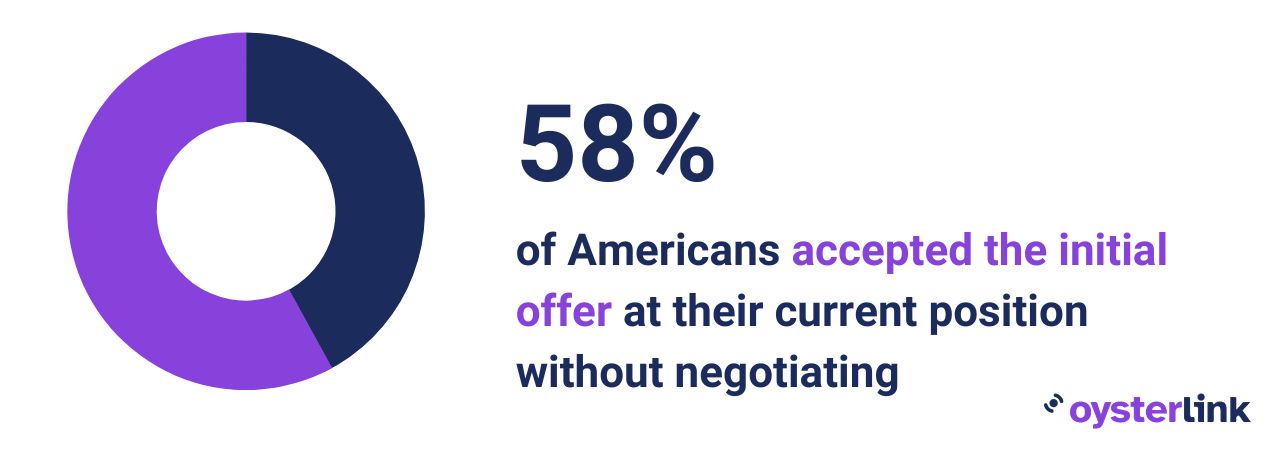
Can you lose a job offer by negotiating a salary?
While it’s possible to lose a job offer by negotiating a salary if done in an overly aggressive or confrontational way, most employers expect some degree of negotiation. It’s essential to negotiate respectfully and professionally.
Should you disclose your current, real salary?
You are not obligated to disclose your current salary, and in some locations, it may even be illegal for employers to ask for it. It’s generally advisable to avoid disclosing your current salary unless you are comfortable doing so and it’s relevant to the negotiation.
Instead, focus on discussing your salary expectations based on your qualifications and industry standards.
Should you justify salary expectations?
Yes, it’s a good practice to justify your salary expectations. Explain how your skills, experience and qualifications align with the job’s responsibilities and industry standards. Providing a rationale for your desired salary can help the employer understand why you believe you’re worth the amount you’re requesting.
What happens if the interviewer reacts negatively when you ask about salary?
If the interviewer reacts negatively when you ask about salary, it’s important to stay calm and professional. Apologize if your question caused any discomfort and clarify that your intention is to gain a better understanding of the compensation structure.
Consider rephrasing your question to make it more comfortable for the interviewer to address the topic.
What if the salary is lower than what you expected?
If the salary offered is lower than your expectations, it’s an opportunity to negotiate or seek additional benefits or perks that may compensate for the lower base salary. Discuss your concerns professionally and express your continued interest in the position.
Be prepared to justify your desired salary based on your qualifications and industry standards. Ultimately, the negotiation process may lead to a mutually acceptable agreement. If not, you can decide whether to accept the offer or explore other opportunities that better align with your expectations.


